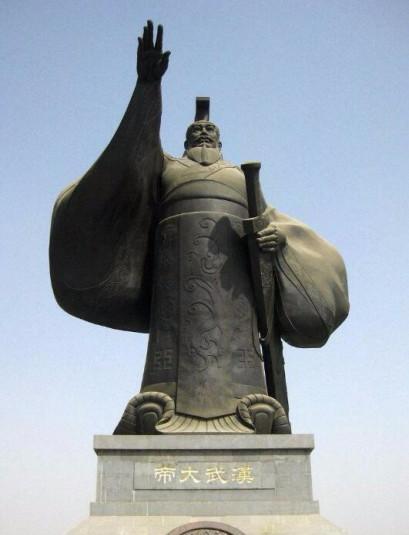In the early years of the Han Dynasty, the practice of superstitious witchcraft was already very popular among the people, and in the later period of the reign of Emperor Wu of the Han Dynasty, it was introduced into the imperial palace, and the Zizhi Tongjian recorded: "Witches came and went to the palace, taught beautiful people to do well, and buried wooden people in each house to sacrifice them; because of jealousy, they even told each other, thinking that there was no way to curse on the curse", and this popular feudal superstitious activity eventually led to the "disaster of witchcraft". Of course, part of the reason for this major event that affected the entire han dynasty and even the historical development of China was that Emperor Wudi of the Han Dynasty was ill, suspicious, and obedient to rumors in his later years.
This superstitious activity disgusted Emperor Wudi of Han at the very beginning - at that time, the capital chang'an gathered all kinds of gods and witches to confuse everyone with the fantasy magic of the side door and the left way, and witchcraft was also rampant in the harem, because of mutual jealousy, when quarreling, they took turns to accuse each other of cursing the emperor, and Emperor Wudi of Han killed hundreds of harem concubines, palace women and implicated ministers in a rage. However, no one expected that a seemingly inconspicuous little incident would become more and more intense to an uncontrollable degree - it directly led to the suicide of Empress Wei Zifu and Crown Prince Liu Zhao!

It is generally believed that the outbreak of the "Scourge of the Witches" was related to the intentions of Emperor Wu of Han himself,he wanted to take advantage of the situation to suppress the powerful Wei Huo forces that remained in the government and the opposition. Therefore, one entry point is that Emperor Wu of Han decided to execute Gongsun He's father and son, the two daughters born to Emperor Wu of Han and Wei Zifu, and Wei Qing's eldest son Wei Qing, taking advantage of some improper behavior of Gongsun He (Wei Zifu's brother-in-law). However, Emperor Wu of Han himself did not expect that there were already people around him who had already set their sights on the next target- Prince Liu Zhao!
In his later years, the political controversy between Emperor Wu of Han and the crown prince Liu Zhao also intensified, and the crown prince opposed Emperor Wu of Han's poor soldier Qianwu and preferred to truce the army to stop the war, in addition, Jiang Chong, who was favored by Emperor Wu of Han in his later years, was suspicious of the crown prince Liu Zhao and Empress Wei, and was worried that Liu Zhao would get rid of himself after he ascended the throne, so he framed the prince to perform witchcraft. Liu Zhi learned of this matter, very worried, at the same time the anti-prince alliance successfully closed the inside and outside, Liu According to unable to know the recent situation of Emperor Wu of Han, in order not to encounter the fate of the qin dynasty's eldest son Fu Su, at the instigation of the young Fu Shide, Liu Zhao, who was in a difficult situation at home and abroad, angrily raised an army to kill Jiang Chong. Later, due to the instigation of the villain, Emperor Wu of Han believed that the prince had plotted rebellion, so he recruited a large army to hunt down the prince, and in this great turmoil, Empress Wei Zifu and crown prince Liu Zhao committed suicide one after another.
In the third year of Zhenghe (90 BC), Emperor Wu of Han repented and learned that the crown prince had no intention of rebellion, and that it was the traitors who had killed Empress Wei and the crown prince Liu Zhao, so he began to take revenge on those who participated in the murder of Liu Zhao.
In December of the third year of Zhenghe, Emperor Wu of Han burned Su Wen to death on the Hengqiao bridge in imitation of Liu Zhao's method of burning Hu Wu, and Li Guangli, who participated in the framing, was exterminated, the prime minister Liu Quyi was beheaded and exterminated, and the culprit Jiang Chong was exterminated. It is worth noting that the criminal law of the Yi clan of the Han Dynasty was abolished during the time of Emperor Wen of Han, and it has not appeared for decades, even if it is a major crime of rebellion, only the father, mother, wife, son and half-father brothers and sisters are seated. At this moment, the Yi three tribes reappeared on Jiang Chong's body, which showed the resentment in the heart of Emperor Wu of Han. The pursuers of the crown prince Liu Zhao and his son who had fought each other while they fled were also exterminated. Shang Qiucheng, Jing Jian, Li Shou, Zhang Fuchang, Mang Tong, and all those implicated in Liu Zhao's death were all liquidated by Emperor Wu of Han.
In the fourth year of zhenghe, Emperor Wu of Han issued a "self-crime edict" to the people of the world, indicating that he had brought suffering to the people, and he would no longer exhaust his military efforts, and at the same time express his inner remorse. Emperor Wudi of the Han Dynasty thus became the first emperor in Chinese history to use the "edict of self-criticism" to criticize himself.